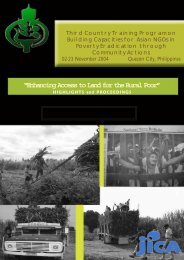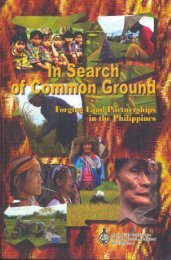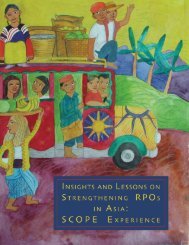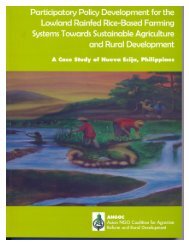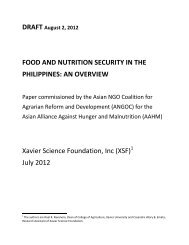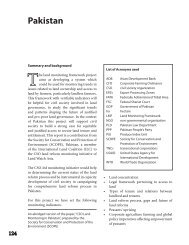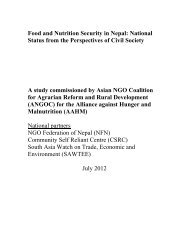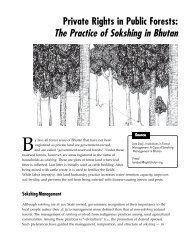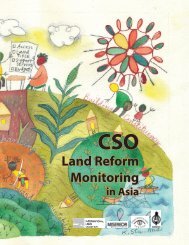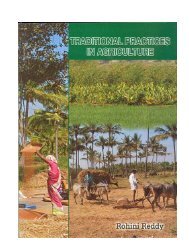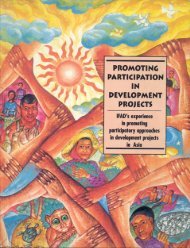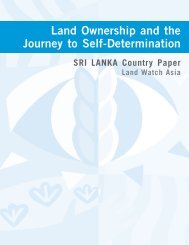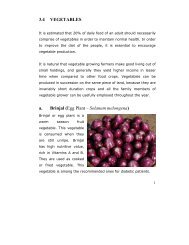Securing the Right to Land FULL - ANGOC
Securing the Right to Land FULL - ANGOC
Securing the Right to Land FULL - ANGOC
You also want an ePaper? Increase the reach of your titles
YUMPU automatically turns print PDFs into web optimized ePapers that Google loves.
SECURING THE RIGHT TO LAND<br />
72<br />
<strong>Land</strong> Management and Administration<br />
Project, Ministry of <strong>Land</strong> Management,<br />
Urban Planning and Construction<br />
The <strong>Land</strong> Management and Administration Project (LMAP) is a<br />
multi-donor funded project formed in 2002 which is being imple-<br />
mented by <strong>the</strong> MLMUPC. LMAP, which is operating in 11 provinces,<br />
is credited with <strong>the</strong> issuance and registration of one million<br />
land titles under <strong>the</strong> systematic titling process, as well as <strong>the</strong><br />
reinforcement of land administration staff at <strong>the</strong> provincial and<br />
national levels.<br />
Stakeholders have acknowledged <strong>the</strong> LMAP’s contribution <strong>to</strong>ward<br />
making <strong>the</strong> process of land titling more systematic and<br />
transparent, and less expensive. However, <strong>the</strong> first phase of <strong>the</strong><br />
LMAP has tended <strong>to</strong> concentrate on communities that are accessible<br />
and has shirked areas with big land conflicts.<br />
Technical Working Groups<br />
Technical Working Groups (TWGs) are partnerships between <strong>the</strong><br />
Government and international donors with some civil society<br />
representation. There are 18 TWGs covering different development<br />
priority areas, including TWG–<strong>Land</strong>.<br />
The TWG–<strong>Land</strong> had helped <strong>to</strong> ensure that <strong>the</strong> sub-decrees on<br />
ELCs and State <strong>Land</strong> Management were developed in consultation<br />
with TWG members and <strong>the</strong> public. However, <strong>the</strong> private<br />
sec<strong>to</strong>r is not represented in <strong>the</strong> TWG, despite its increasingly<br />
influential role in land concerns. In addition, <strong>the</strong> NGO and civil<br />
society representatives in <strong>the</strong> TWG have so far played only a<br />
limited role. Coordination within and between <strong>the</strong> different<br />
TWGs also needs improvement.<br />
National Authority on <strong>Land</strong> Dispute Resolution<br />
The National Authority on <strong>Land</strong> Dispute Resolution (NALDR) was<br />
created by <strong>the</strong> Government in March 2006 <strong>to</strong> complement <strong>the</strong><br />
work of <strong>the</strong> courts, and <strong>to</strong> resolve land disputes beyond <strong>the</strong> jurisdiction<br />
or capacity of <strong>the</strong> Cadastral Commission. Civil society<br />
groups have declined <strong>to</strong> join <strong>the</strong> NALDR for fear that <strong>the</strong> institution<br />
was biased, that <strong>the</strong>y would be exploited by <strong>the</strong> Government<br />
and would lose <strong>the</strong>ir independence. As an alternative <strong>to</strong><br />
formal membership in <strong>the</strong> NALDR, <strong>the</strong> NGOs would provide support<br />
and act as an independent moni<strong>to</strong>r. However, since <strong>the</strong><br />
NALDR was formed, its representatives have not met with <strong>the</strong><br />
NGOs, despite <strong>the</strong> latter’s request. The institution also creates a<br />
parallel level of bureaucracy without a clear mandate or terms<br />
of cooperation with <strong>the</strong> Cadastral Commission. This has under-<br />
mined <strong>the</strong> role and rule of <strong>the</strong> courts and <strong>the</strong> Cadastral Commission<br />
in adjudicating land cases.<br />
Opportunities, Risks and Challenges<br />
<strong>to</strong> Advance Access <strong>to</strong> <strong>Land</strong> and<br />
Tenurial Security<br />
Opportunities<br />
NGOs’ Acknowledgment of <strong>the</strong> Importance of <strong>Land</strong><br />
Partnerships<br />
There is general interest among NGOs in establishing partnerships<br />
<strong>to</strong> improve <strong>the</strong> people’s access <strong>to</strong> land. There are<br />
calls for <strong>the</strong> formation, initially, of regional or local partnerships<br />
which prioritize project implementation and specific<br />
cases. This would benefit from <strong>the</strong> effectiveness of lower<br />
levels of administration in resolving land disputes.<br />
Donor Interest in Working with <strong>the</strong> Government<br />
According <strong>to</strong> <strong>the</strong> Paris Declaration on Aid Effectiveness<br />
(2005), building long-term partnerships with <strong>the</strong> government<br />
is <strong>the</strong> core strategy of international and development<br />
organizations. All donors also acknowledge <strong>the</strong><br />
Government’s ownership of development projects and<br />
strive <strong>to</strong> harmonize efforts.<br />
Risks and Challenges<br />
Lack of Equitable and Effective <strong>Land</strong> Partnerships at<br />
<strong>the</strong> National Level<br />
This bears strongly on local level decision-making and must<br />
be addressed as a priority concern.<br />
Limits and Constraints <strong>to</strong> Progress of <strong>Land</strong> Partnerships<br />
in Cambodia<br />
In order <strong>to</strong> promote land partnerships in <strong>the</strong> country, strong<br />
networks and linkages among NGOs need <strong>to</strong> be established.<br />
Dwindling sources of funding are forcing NGOs <strong>to</strong> compete<br />
ra<strong>the</strong>r than cooperate. NGOs need <strong>to</strong> understand <strong>the</strong> benefits<br />
of networking and partnerships, find ways <strong>to</strong> support each<br />
o<strong>the</strong>r, and even <strong>to</strong> recognize which among <strong>the</strong>m is best able<br />
<strong>to</strong> represent <strong>the</strong>ir sec<strong>to</strong>r in dealing with <strong>the</strong> Government.<br />
A number of existing partnerships of NGOs do not have<br />
clear goals, or have goals that overlap with those of o<strong>the</strong>r<br />
institutions or partnerships. O<strong>the</strong>r partnerships have also<br />
been criticized for focusing <strong>to</strong>o much on “talking” and <strong>to</strong>o<br />
little on “doing.”



